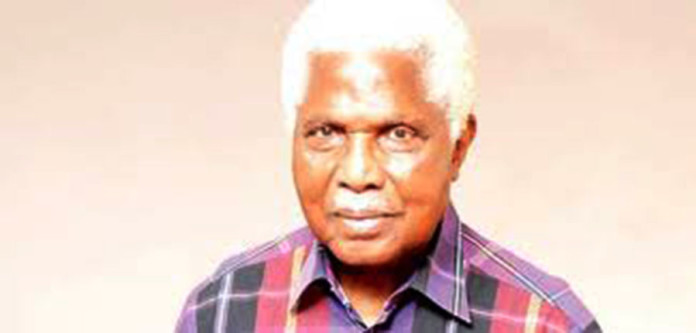By Emeka Alex Duru
The saying, according to philosophers, is that some are born great, while some attain greatness.
In many ways, Vice President of the erstwhile Second Republic, Dr. Alex Ifeanyichukwu Ekwueme, fitted into the two Worlds. Scion of the legendary Ekwueme dynasty of Oko, Anambra State, he could be said to be great by birth. But it was, perhaps, on account of his personal accomplishments, while alive, that his greatness shone, more.
It was therefore, not surprising that on his demise on Sunday November 19, 2017, exactly three weeks after he suddenly took ill at his Enugu home, and exactly one week after he was flown abroad for treatment, Nigeria, literally stood still.
His Anambra State governor, Willie Obiano, captured the mood of the nation, in a befitting tribute, a day after. “A great Iroko has fallen. Nigeria has lost a statesman. Ndigbo have lost an illustrious son. Anambra has lost a father…This is a big loss on all fronts”, the governor lamented.
Obiano was right, in many respects. Ekwueme represented many things to many people. Some principles however run through in almost all the commentaries on him. They are integrity, probity, transparence, courage and commitment to a given cause. And he manifested these at various times in his 85 years of existence.
Take for instance, his encounter with the military after the overthrow of the civilian administration that he served as Deputy to President Shehu Shagari between 1979 and 1983.
On account of unfavourable public opinion that portrayed the politicians of the era as being highly corrupt and insensitive to the plight of the masses, a group of military officers, led by the then Major General Muhammadu Buhari (current President), staged a coup that toppled the administration.
Riding on the mood of the moment, the military regime handed the key officers and chieftains of the Shagari administration various terms of imprisonment in line with the pronouncement of a tribunal set up against them.
Like others, Ekwueme was imprisoned, even as he insisted on his innocence on the charges against him. 20 months after, when the Buhari government was overthrown by another group of soldiers led by Ibrahim Babangida, Ekwueme was acquitted by an appeal panel set up by the government to review the cases against the politicians.
In a judgement that remains unprecedented in the country’s history, the late statesman was shown to have set a standard in government that could only be attained by Angels. Part of the observations of the panel was that Ekwueme came out of government poorer than he was before going into service.
That was all that Nigerians needed to know that the former vice president, who had a chain of degrees in such wide areas as History, Sociology, Philosophy and Architecture, where he capped it all with a Doctorate (PhD), did not go into politics, a pauper angling for enrichment, but purely for service.
More facts on Ekwueme’s granite courage and commitment to a given cause, began to be clearer in subsequent years, especially in his engagements with the successive military and civilian administrations in the land.
He was for instance, among the principled Nigerians that stuck out their necks in instituting the current civilian dispensation. And this was not without cost.
By 1998, when the nation was literally convulsed with the maddening chorus of the late General Sani Abacha’s self-succession agenda, Ekwueme led other courageous Nigerians to call the bluff of the late head of state.
Abacha and his cheer men had manipulated the then five political parties in adopting him as their sole candidate in the 1998 presidential election. This was with the obvious intention of selling a dummy to the international community that Nigerians were begging him to transform to a civilian president.
However, Ekwueme and other compatriots, fired a well-worded letter to the military ruler in which he was bluntly told that his antics were bound to fail. Abacha and his goons did not take kindly to the exhibition of audacity by the late elder statesman. Pronto, the government went after his business interests, hoping to get him on his knees.
But Ekwueme, the famed Ide Aguata, was hardly bothered. For him, the action by his group was motivated by the need to save the fatherland.
In pursuing this cause, Nigerians were, in fact, amazed at the action of the man that many had considered a conservative that would not go against the system.
But perhaps, unknown to them, Ekwueme had performed similar feat, earlier. At the 1994-95 constitution conference in Abuja for instance, the late Vice President, not known for banging on the table while making his points, had mobilized progressive members of the confab into arriving at an arrangement that resulted into the country’s current six geo-political structure.
Till date, not even his critics have denied the fact that the initiative has provided a platform for addressing some of the fears hitherto entertained by certain component parts of the country.
Even with the onset of democracy, he never rested in his quest for a just and egalitarian society. Remarkably, in his agitations, he regularly fell back on the constitution and law as his guiding instruments.
When, for example, in the later years of the immediate past Goodluck Jonathan presidency, a huge controversy arose in Peoples Democratic Party (PDP), over its zoning arrangement, Ekwueme, a foundation member of the party, rose to the occasion and offered informed insight that ensured relative stability in its fold.
Rising beyond the cacophonic voices of ill-informed or rented commentators, Ekwueme, who was at a time PDP Board of Trustees chairman, took the issue from its roots at the 1994 confab, explaining how the arrangement was arrived at.
He said; “At that conference, it was agreed that there would be rotation between the South and North; in the North among the three geo-political zones; in the South, among the three geo-political zones.
“All this was contained in the 1995 constitution which General Sani Abacha was to promulgate before taking up the proposed civilian presidency in October 1998.
“As you well know, he died in June of that year. So, this constitution was not promulgated”, he said.
The constitution, he explained had envisioned a one-term five-year presidency. The agreement, Ekwueme added, was inherited by the facilitators of PDP at its formation but the arrangement began to be breached in 2002, when the then President Olusegun Obasanjo, who needed a second term, mobilised the expanded caucus of the PDP and had his way.
With that careful explanation, Ekwueme laid the matter to rest. Not a single member of the party, contradicted his position on the matter. He was rather applauded by key members of the party for his forthrightness. In fact, Retired Major-General David Jemibewon, chairman of the party’s drafting committee, in obvious excitement over Ekwueme’s courageous intervention, had then enthused, “I agree with whatever he says. He is a decent man. He is an elder statesman”.
Not only at the party level had he brought his person and intellect as a stabilising force. Even at a loss to his personal interest and ambition, Ekwueme had set standards that many find difficult to match.
At the Jos, Plateau State PDP national convention in 1998, when it was apparent that the military wing of the party had skewed the presidential ticket to favour Obasanjo, one of their own, there were fears that Ekwueme was going to pull out his followers from the party. But he did not. Even the offer of the Senate Presidency that was made to him, did not appeal to him as a person. He rather cornered it for his South East zone.
In other instances that the PDP had found itself at the crossroads, at least up to 2015, the leadership and members had looked up to him for putting the house in order.
It is on the backdrop of these selfless dispositions of the late politician that commentators from different parts of the country are agreed, that his passage would certainly create a void in the polity.
Former Vice President and PDP chieftain, Atiku Abubakar, noted as much in his tribute on Sunday, January 28, 2018. According to him, Ekwueme has left a lasting impression and indelible footprints in Nigerian politics and society, adding, “ He will undoubtedly be sorely missed especially at a time like this when many issues on which he stood and fought, including national integration and a viable and genuine federal structure, remain unresolved”.
He added that Ekwueme was a great man and one of those who truly loved Nigeria. Former Anambra governor, Peter Obi, agreed, stressing that the deceased was a good Nigerian, who showed example through his commitment to nation- building.
Obi said: “the best way to preserve his memories is through good governance along his lofty dreams of peace and development anchored on justice and equity, which he pursued with adamantine consistency.”
This is a challenge to the country, as the elder statesman is laid to rest on Friday, February 2, 2018, in his Oko, Anambra home town.
Dr. Alex Ifeanyichukwu Ekwueme, was born on October 21, 1932. He was the first Vice-President of Nigeria, serving 1979 – 1983. He started primary school at the St John’s Anglican Central School, at Ekwulobia, then he proceeded to King’s College, Lagos As an awardee of the Fulbright Scholarship in the United States America (being one of the first Nigerians to gain the award). He also attended the University of Washington where he earned Bachelor’s degree in Architecture and City Planning. He obtained his Master’s degree in Urban Planning. Ekwueme also earned degrees in sociology, History, Philosophy and Law from University of London. He later proceeded to obtain a Ph.D. in Architecture from the University of Strathclyde, before gaining the BL (Honours) degree from the Nigerian Law School. He was married and had children.














